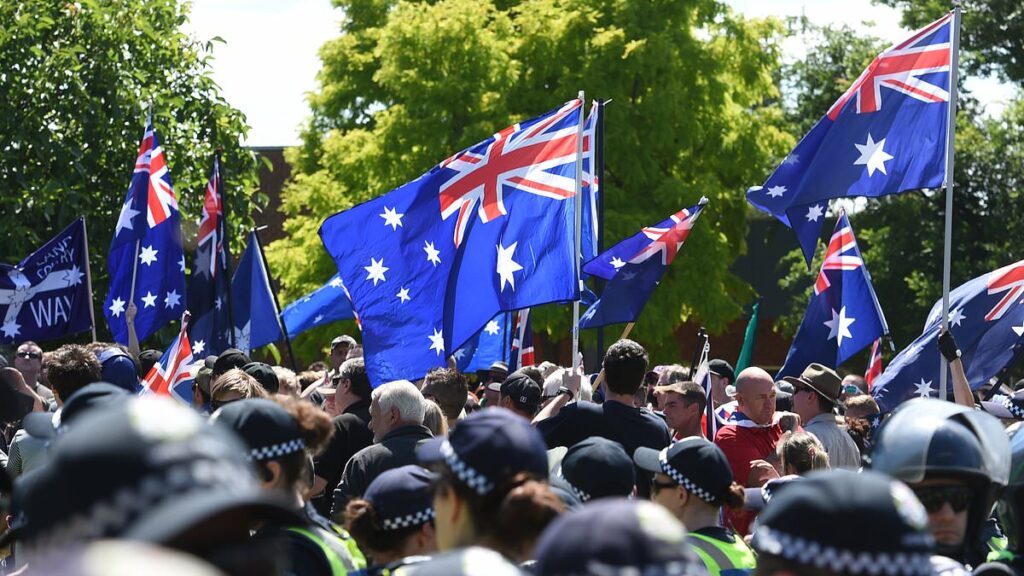
In a bold move, the anti-immigration group March for Australia has released a manifesto condemning what it describes as ‘endless migration,’ just days ahead of planned protests in major cities across Australia. The rallies, set to occur at 12 p.m. on Sunday, August 31, will take place in all capital cities, as well as Townsville and Cairns. The group argues that mass immigration is driven by big business interests and supported by major political parties.
The manifesto claims that corporations and institutions such as Coles, Woolworths, the big banks, and universities are proponents of a ‘Big Australia’ agenda, aiming for a population exceeding 100 million. The group states, “Each migrant means they can sell another 365 days’ worth of food, or another mortgage. The only cost? Our nation.”
Rallying Against Migration: A National Movement
The demonstrations are intended to unite Australians around a variety of concerns, including culture, wages, and infrastructure. “Whether you’re concerned for our culture, wages, traffic, housing supply, water supply, environmental destruction, infrastructure, hospitals, crime or loss of community, we are stronger together!” the manifesto declares.
The group cites a June 2025 Lowy Institute poll indicating that most Australians believe migration levels are too high.
“Polling by the Lowy Institute in June 2025 found that the majority of Australians think the number of migrants coming into the country each year is ‘too high’. This is a transformation that we never sought, nor consented to. Our political elite ignore the views of the majority, yet call it ‘democracy’.”
Political and Public Reactions
The announcement comes amid increasing public discourse on immigration policies in Australia. March for Australia accuses both major political parties of supporting mass migration, referencing former Prime Minister Bob Hawke’s biography, which suggests an implicit agreement not to discuss migration. “The Labor–Liberal uniparty, both controlled by their donors, had a 25 percent difference in migration intake at the last election. Same policy, different branding. It’s time for change!” the group asserts.
Meanwhile, the Albanese government and public figures have criticized the protests. Home Affairs Minister Tony Burke condemned the rallies, stating, “There is no place in our country for people who seek to divide and undermine our social cohesion.” Former reality star Abbie Chatfield also labeled the protesters as ‘racist’ and ‘bigoted.’
Historical Context and Cultural Impact
March for Australia argues that the recent influx of migrants is causing profound cultural changes, claiming that more Indians have migrated to Australia in the past five years than Italians and Greeks did in the previous century. “We know migration has a cultural impact. This isn’t a slight cultural change – it’s replacement plain and simple. Australia is not an economic zone to be exploited by international finance. Australia is our home,” the manifesto states.
These demonstrations follow a recent 90,000-strong pro-Palestine rally that shut down the Sydney Harbour Bridge, highlighting the growing trend of public demonstrations in Australia. The group insists it is not linked to extremist organizations, emphasizing its identity as a “grassroots coalition of nationalists, patriots, and everyday Australians.”
Locations and Logistics
Protest locations have been confirmed across the country. In Sydney, the rally will be held at Belmore Park, while Melbourne’s protest will take place outside Flinders Street Station. Brisbane’s event is scheduled for Roma Street Parklands, and Perth’s at Supreme Court Gardens. Other cities, including Adelaide, Canberra, Darwin, Townsville, and Cairns, have also designated rally sites.
The Road Ahead: Implications and Consequences
As the nation braces for these demonstrations, the debate over immigration continues to polarize public opinion. While March for Australia calls for a reduction in migration, critics argue that such views undermine Australia’s multicultural identity. The protests are set to test the nation’s commitment to social cohesion and its ability to navigate complex demographic challenges.
With the rallies just around the corner, the conversation about Australia’s future immigration policy remains as heated as ever. The outcome of these protests could influence political discourse and policy decisions in the months to come, as Australia grapples with its identity in a rapidly changing world.







